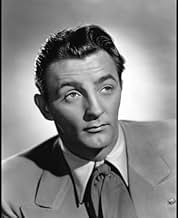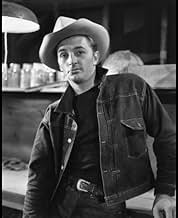AVALIAÇÃO DA IMDb
6,7/10
1,7 mil
SUA AVALIAÇÃO
Adicionar um enredo no seu idiomaDrama about former WW2 Marines readjusting to civilian life and dealing with their mental and physical traumas.Drama about former WW2 Marines readjusting to civilian life and dealing with their mental and physical traumas.Drama about former WW2 Marines readjusting to civilian life and dealing with their mental and physical traumas.
Harry von Zell
- Scuffy
- (as Harry Von Zell)
John Bailey
- Interviewer
- (não creditado)
Bobby Barber
- Arcade Game Player in Saloon
- (não creditado)
Bill Barnum
- Jackson
- (não creditado)
Dick Benjamin
- Sergeant
- (não creditado)
Paul Birch
- Marine Wanting Farm
- (não creditado)
- Direção
- Roteiristas
- Elenco e equipe completos
- Produção, bilheteria e muito mais no IMDbPro
Enredo
Você sabia?
- CuriosidadesJean Porter and Edward Dmytryk met during the making of this film and would be married in 1948, until his death in 1999.
- Erros de gravaçãoOn the bus arriving at the Marine base at the beginning, California is misspelled "Caliornia."
- Citações
Cliff Harper: We parted company when he was dumb enough to get shot!
William Tabeshaw: Why don't you own up,Harper? I was a big hero and you were a coward!
- ConexõesFeatured in Hollywood the Golden Years: The RKO Story: Dark Victory (1987)
- Trilhas sonorasTill the End of Time
by Buddy Kaye and Ted Mossman, based on Chopin's "Polonaise"
Music by Frédéric Chopin (uncredited)
Avaliação em destaque
The year after World War II ended brought the first dramas to look at the plight of returning veterans trying to readjust to civilian norms. The Best Years of Our Lives was the big hit that year, but there were others, too. The title song in Till The End of Time, which was adapted from a Chopin polonaise, snakes through the movie wearing many skins, from saraband to Swing, constituting one of the more effective leitmotifs of 40s-movie scores. The story centers on Guy Madison, returning from the Pacific to his Los Angeles family. His parents expect the boy who left, not the man (physically, at least) who came back; they recoil when he wants to share his experiences in battle. So he starts to rebel against their sheltered and complacent life but has little idea of what to do with his own.
His love life is riven as well. One the one side there's the brash bobby-soxer next door, symbolizing what he used to be; on the other is weary war-widow Dorothy McGuire (among her most affecting roles), another survivor of the horrors of combat.
It's tempting to assume that Madison landed this meaty role (he's constantly on screen) solely because of his looks -- extraordinary, even by Hollywood standards. But he delivers a natural, if a bit bashful, performance. Only when buddy Robert Mitchum resurfaces halfway through the movie does he suffer by comparison. As a black sheep with a steel plate in his skull, Mitchum strikes the sparks that would ignite his long stardom; Madison, while pleasant and competent, comes up with nothing new and starts to grow monotonous (his career took him to TV westerns and European cheapies).
Director Edward Dmytryk (Murder, My Sweet; Back to Bataan) tones down for this leisurely character study, which remains absorbing and at times close to moving. He missteps once, very near the end, when a blast at bigotry comes flying out of left field, and he probably had to settle for the upbeat ending the studio wanted. But it was left to film noir, which dealt with similar issues obliquely (Blue Dahlia, Act of Violence, Dmytryk's own Crossfire) that probed them more profoundly.
His love life is riven as well. One the one side there's the brash bobby-soxer next door, symbolizing what he used to be; on the other is weary war-widow Dorothy McGuire (among her most affecting roles), another survivor of the horrors of combat.
It's tempting to assume that Madison landed this meaty role (he's constantly on screen) solely because of his looks -- extraordinary, even by Hollywood standards. But he delivers a natural, if a bit bashful, performance. Only when buddy Robert Mitchum resurfaces halfway through the movie does he suffer by comparison. As a black sheep with a steel plate in his skull, Mitchum strikes the sparks that would ignite his long stardom; Madison, while pleasant and competent, comes up with nothing new and starts to grow monotonous (his career took him to TV westerns and European cheapies).
Director Edward Dmytryk (Murder, My Sweet; Back to Bataan) tones down for this leisurely character study, which remains absorbing and at times close to moving. He missteps once, very near the end, when a blast at bigotry comes flying out of left field, and he probably had to settle for the upbeat ending the studio wanted. But it was left to film noir, which dealt with similar issues obliquely (Blue Dahlia, Act of Violence, Dmytryk's own Crossfire) that probed them more profoundly.
- bmacv
- 3 de mar. de 2002
- Link permanente
Principais escolhas
Faça login para avaliar e ver a lista de recomendações personalizadas
- How long is Till the End of Time?Fornecido pela Alexa
Detalhes
- Data de lançamento
- País de origem
- Idioma
- Também conhecido como
- Hasta el fin del tiempo
- Locações de filme
- Los Angeles, Califórnia, EUA(Vermont Avenue and 4th Street)
- Empresas de produção
- Consulte mais créditos da empresa na IMDbPro
- Tempo de duração1 hora 45 minutos
- Cor
- Proporção
- 1.37 : 1
Contribua para esta página
Sugerir uma alteração ou adicionar conteúdo ausente

Principal brecha
By what name was Noite na Alma (1946) officially released in India in English?
Responda
























